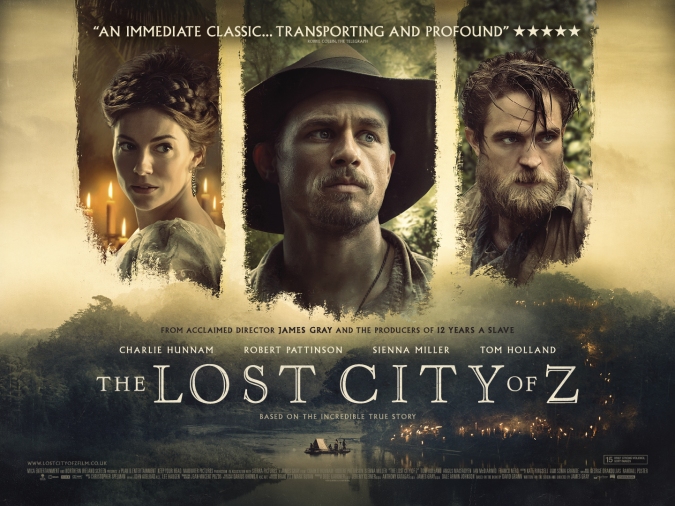
It took me a while to ‘get’ this film, but certain imagery and sequences have kept coming back to haunt me, with a hallucinatory relentlessness that recalls fever dreams and Apocalypse Now.
Like that great film, this one is largely set in the jungle (this time in Bolivia), and features out-of-their-depth westerners traveling down a river (this time the Amazon) and out of their minds. You can feel the sticky heat oozing off practically every inch of every frame as British explorer Percy Fawcett (a real-life figure who partially inspired Indiana Jones), played by Charlie Hunnam, and his team venture downstream in the early 20th century. First they go in search of a conciliation between the Bolivian and Brazilian tribes at the border, in order to stabilise the price of rubber. Then they head off in search of a lost civilisation, which at times only Fawcett and the native Bolivians believe they will find.
Is Fawcett mad? Perhaps not in the literal sense of Captain Willard in Apocalypse Now or Aguirre in Wrath of God: Fawcett is more practical, calm and collected than either of those conquistadors. He never resorts to indefensible violence against any of his co-explorers or the natives they encounter, and his thoughtful demeanour deflects accusations of delusions of grandeur. Yet there is a strange subconscious compulsion that draws Fawcett back, three times, to the dangerous Bolivian jungle in search of his lost city; just like Beowulf who fought monsters, three times, we know that it will inevitably end in tragedy. Maybe it’s a desire for prestige that drives him – we’re told early on that his father drank and gambled away their family’s reputation, so there’s clearly the concern of having to return honour to the family name. But in arguing for the existence of an intelligent tribe that predates white Europeans, Fawcett does take quite the gamble with his reputation, at the possible expense of his family’s wellbeing – remember this is stuffy, imperialist-minded Britain (MPs openly jeer him, like primates, at Westminster in one of the film’s best setpieces). Could it be that Fawcett’s interests are genuinely anthropological? Or is there something more basic about the rainforest that keeps on drawing him back, a primitivism that leans closer to God than he could ever have imagined?
So he’s a complicated chap, played with admirable reserve by Charlie Hunnam. Hunnam’s performance has unfairly been attacked for lacking charisma by some critics, presumably because he doesn’t go all bug-eyed schizoid on our asses like Martin Sheen or Klaus Kinski. But the film’s dreamlike logic tends to pull back from any literal interpretations, and Hunnam’s underacting considerably deepens both his character’s and the film’s mysteries.
The dreamlike vagueness does wonders for creating interest in the mirage personality of Percy Fawcett then, but the haziness also undercuts the efforts of the supporting cast in reducing their roles to anonymities. Robert Pattinson as a fellow explorer struggles to act his way through a stifling beard. Sienna Miller as the wife isn’t given enough time to explore the interesting oxymoron of her being a homebound feminist. And Tom Holland as the son is sullen and then suddenly in awe of his father in a way that doesn’t quite add up. They all leave only a slight impression, which I don’t believe is the fault of the actors but the fault of the director, James Gray.
Gray has shown brilliance before – take 2013’s The Immigrants, for instance – and though he orchestrates the photographic contrasts between London city life and the humid climes of Bolivia with a keen eye, and also writes dialogue with a distinct ear that holds you to the screen, I feel that his grip on The Lost City of Z is not quite tight enough. It’s easier to create an air of mystery than to offer specific answers to questions raised, particularly when filming in the wilderness of nature, and his dodging of narrative convention is sometimes intriguing but often structurally clunky. There is little forward-motion to smooth over the cracks.
In comparison, despite its many excesses, Apocalypse Now offers us a firmer vision: a delineation of human horror that is at once terrible, awe-inspiring, and exciting. Herzog’s films seem clearer on the mad pursuit of dreams. And last year’s The Revenant explores the intersection of mankind, nature, and God with greater depth.
Where does that leave us with The Lost City of Z? A somber, well-made film it most surely is, and the ending is so shrouded in the many mysteries that it has accumulated as to genuinely touch upon the unheimlich.
Yet like its hero’s quest, James Gray’s film never quite reaches its destination. Which is a shame. But perhaps it was the intention all along, for both of them.

Your review is far more entertaining than the film itself. For me, it was a meandering incoherant story, a film that has no clear idea of what it wants to be. Its a mashup of several genres and at most a solid tale made lacklustre in the telling.
LikeLiked by 1 person
Sorry to hear that you didn’t enjoy it! I agree that it’s flawed, but certain moments really stuck with me, particularly the mysterious ending.
LikeLiked by 1 person